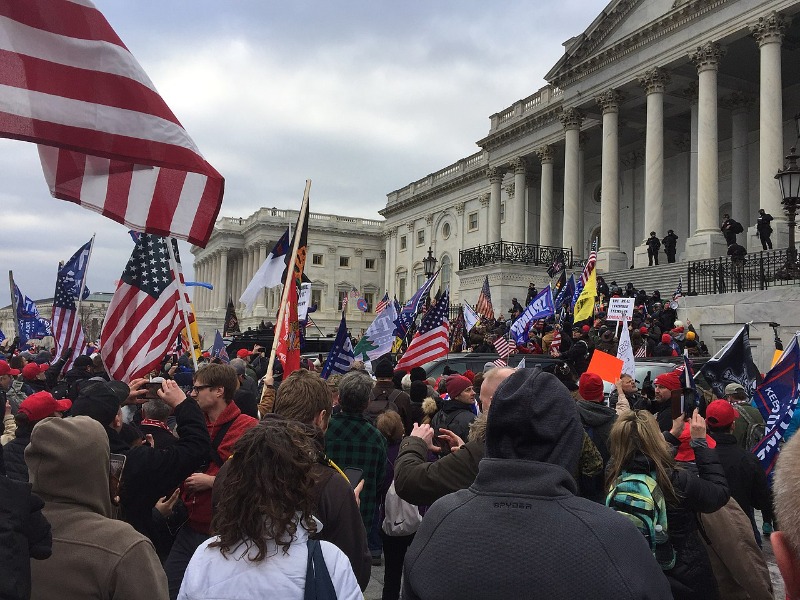A Foreign Intelligence Analyst Report on President Trump
In our previous jobs as CIA analysts, we wrote analyses on foreign countries, leaders, and other political figures for senior U.S. policymakers like the President and a small number of Cabinet-level officials. Current developments in the United States strike many as “through the looking glass,” and it might be a useful exercise to go all the way and consider American politics from the outside looking in.
Published by The Lawfare Institute
in Cooperation With

In our previous jobs as CIA analysts, we wrote analyses on foreign countries, leaders, and other political figures for senior U.S. policymakers like the President and a small number of Cabinet-level officials. Current developments in the United States strike many as “through the looking glass,” and it might be a useful exercise to go all the way and consider American politics from the outside looking in. Using the fundamentals of intelligence analysis and “open source” reporting for our source, below we have prepared what a foreign intelligence service analysis of our country might look like. These types of analyses—for example the Presidential Daily Brief—are prepared as a dispassionate product but include the substantive judgments and assessments of the author’s analytic bottom line. We’ve attempted to approximate the types of information foreign analysts would be likely to include, as well as the nature in which such information might be characterized.
United States: Trump Populism Driving Tectonic Shift in U.S. Politics
It is highly likely that we are witnessing a tectonic shift in the conduct of U.S. domestic politics and foreign policy. A populist movement across the United States, driven by perceived corruption and inequality, culminated in the election of Donald Trump. As is typical of populist leaders, Trump is attempting to consolidate power within his immediate circle. Trump’s approach is to discard traditional policy-making processes, then amplify his choices through social media in order to garner support.
- Akin to populist maneuvering in other countries, Trump appears to be engaging in a strategy of undermining long-standing impartial U.S. Government institutions that are cornerstones of the national security and foreign policy apparatus. His tactics include public criticism, discounting the validity or worth of the organizations, and extreme budget cuts.
- Trump’s unorthodox policy process results in confusion and inconsistent messaging between the White House and his Cabinet. It is not currently possible to obtain a clear or consistent understanding of U.S. domestic and foreign policy strategy.
- The opposition Democratic Party, while vocal, remains largely ineffective. The Democrats have lost seats in Congress and state government for the last 7 years. The Republican Party holds the majority in both houses of Congress. While the President is highly unpopular, it is unclear whether the Democrats will be able to regain control of Congress in 2018 midterm elections which requires overcoming disadvantageous electoral line drawing—known as gerrymandering—among other challenges.
- In 2017, the Economist Intelligence Unit downgraded the United States from a “full democracy” to a “flawed” one after Trump’s election. It would have been impossible to predict this development in years prior and, thus, it is difficult to know whether and how President Trump’s tenure will cause additional downgrades.
The President of the United States’ primary focus appears to be promoting himself to his supporters through campaign rallies and his personal and official Twitter accounts. Trump’s termination on Tuesday of the Director of the Federal Bureau of Investigation (FBI), James Comey, is emblematic of his personality-driven approach to governance and leadership.
- The U.S. President has the prerogative to fire senior executives, particularly Department and Agency heads. However, the termination of FBI Director Comey has been deemed suspicious by U.S. media and parts of the constituency in light of the timing and allegations of Russian influence. U.S. media is developing substantial reporting regarding the conditions surrounding Mr. Comey’s termination and more information is likely to be forthcoming. For example, The New York Times on Wednesday reported that Mr. Comey’s termination followed his request for more resources to probe the alleged ties between some of Trump’s advisors and Moscow in the run-up to last year’s election. A national wire service later reported the decision was made as a result of Mr. Comey’s unwillingness to preview testimony he gave before the U.S. Congress last week.
- The effect of Mr. Comey’s dismissal on the ongoing official investigation of Russia’s alleged ties to the Trump campaign in the run-up to the 2016 election remains unclear. It is possible that investigation will be slowed or halted completely.
- Mr. Trump uses Twitter in order to rally his supporters in the face of critical media coverage, which he routinely dismisses as “fake news.” Trump’s lack of discretion on Twitter creates a rich source of direct insight into how he processes information and handles the challenges of governing. Other foreign governments are likely also relying on Twitter as an intelligence resource.
The Republican-controlled Congress does not exhibit signs of restraining the Presidents’ agenda. Despite predictions of U.S. political scientists and others following the U.S. presidential election, the Republican-controlled Congress has not, to date, restrained Mr. Trump.
- Mr. Trump has a looser relationship with traditional Republican policy positions than past Republican elected officials—for example, he was unaware of the Republican position on single-payer healthcare in a 2015 debate. However, contrary to predictions, this distance does not appear to make congressional leaders like Speaker of the House Paul Ryan and Senator Majority Leader Mitch McConnell more inclined to challenge the president.
- In the aftermath of Trump’s decision to fire the Director of the Federal Bureau of Investigations earlier this week, McConnell reiterated his objection to an investigation of the alleged involvement of the Russian government in last year’s presidential election despite the discomfort of some members of his own party.
- Trump had adopted an aggressive approach towards Congress, including one-time Republican allies. Trump publicly issues harsh criticisms of member who he perceives as opposing or questioning his vision or agenda. As with other public communications, Mr. Trump’s preferred method is through Twitter.
- Members of Congress are more likely to be sensitive to the public opinion than Mr. Trump is. The U.S. press has highlighted the number of Republicans members who are up for election in districts won by Democratic party nominee former Secretary of State Hilary Clinton in last year’s election in the aftermath of the House of Representatives’ passage of an unpopular healthcare bill.
- Despite the unusually tenuous nature of the relationship between Mr. Trump and congressional members of his own party, it is unclear under what conditions those members would break with Trump nor what such a break might look like over time. Notwithstanding persistent speculation among commentators regarding impeachment, there is no current evidence to support the claim that a Republican-controlled Congress would be willing to remove Mr. Trump.






